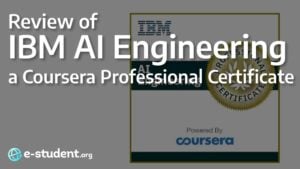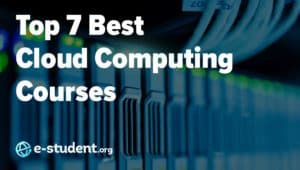E-learning, also referred to as online learning or electronic learning, is the acquisition of knowledge that takes place through electronic technologies and media. In simple language, e-learning is defined as “learning that is enabled electronically.” Typically, e-learning is conducted on the Internet, where students can access their learning materials online at any place and time. E-learning most often takes place in the form of online courses, online degrees, or online programs. There are many different examples of e-learning out there, which we’ve covered in greater detail in our previous articles.
These are the topics covered in this post:
Defining E-Learning
What is the value of e-learning?
Online learning has numerous advantages over traditional learning methods. Some of these include the possibility for students to make use of self-paced learning and to choose their learning environments. E-learning is cost-effective and cost-efficient, as it removes the geographical obstacles often associated with traditional classrooms and education.
Taking these benefits and many more into consideration, it becomes evident why the current trends in e-learning show remarkable growth for the industry. Worldwide e-learning revenue is expected to grow to $325 billion by 2025, which is remarkable considering the fact that the number was only a third of this – $107 billion – in 2015.
With that being said, it must be noted that e-learning is certainly not without its disadvantages. The various types of e-learning all come with sacrifices in one way or another. Increased risk of cheating during assessments, social isolation, and lack of communication skill development in online students are just some of the challenges of e-learning that need to be addressed. Please read our separate post on the disadvantages of e-learning to get a better overview of the drawbacks associated with e-learning.
To give you some visual stimulus, here’s a short video to demonstrate what e-learning is.
What is the definition of e-learning?
There are as many definitions of e-learning as there are educational scientists worldwide. To get a better overview of the various academic definitions of e-learning, let’s look at some examples from different academic institutions and educational researchers.
Sarah Guri-Rosenbilt from the Open University of Israel explored the exact definition of e-learning in her 2005 research paper “’Distance Education’ and ‘E-Learning’: Not the Same Thing”.”She defined e-learning as electronic media used for various learning purposes ranging from conventional classroom add-on functions to online substitution for face-to-face meetings with online encounters.
Clark and Mayer defined e-learning as instructions delivered through digital devices to support learning in their 2016 research paper “E-learning and the science of instruction: Proven guidelines for consumers and designers of multimedia learning.”
Arkorful and Abaidoo defined e-learning as using information and communication technologies to enable access to online teaching and learning resources in their 2015 research paper “The role of e-learning, advantages and disadvantages of its adoption in higher education.”
Ruiz, Mintzer, and Leipzig defined e-learning as using Internet technologies to enhance performance and knowledge in their 2006 research paper “The Impact of E-Learning in Medical Education.”
For an example of how a government actor defines it, eLearningNC.gov has defined e-learning as learning by utilizing electronic technologies for accessing educational curriculums outside of traditional classrooms.
As it appears, answering the question of what is the definition of e-learning is not as easy as it might first seem. The differences between e-learning and distance learning are subtle but important, and it’s essential to distinguish between them.
What is e-learning used for in education?
E-learning is used across all sectors of the economy and society – consequently, there are plenty of examples of e-learning being used effectively.
Adult E-Learning
For adults, online learning often addresses many of the challenges adult learners face when trying to continue their studies. Online learning allows them to progress at their own pace, submit assignments and take assessments at times best suited for them. This kind of flexibility is especially beneficial for adult learners because, often, they are forced to balance employment, family duties, and online learning altogether.
Corporate E-Learning
Companies use e-learning to boost the knowledge, skills, and overall productivity of their employees while cutting down on the costs normally associated with employee training. Successful companies that have utilized e-learning in the past include Toyota, Shell, PayPal, and Lyft, among others.
On the other hand, for career seekers and unemployed people, e-learning has become an effective method for boosting their resumes and developing new skills in the fields they are most interested. Not only are there online learning courses available for virtually any career direction, but there are even “career track” online training programs that often come with a guaranteed job proposal for all graduates (see, for example, our review of Springboard).
Online Colleges
For educational institutions, e-learning brings perhaps the most potential uses of all. Many accredited online colleges already offer online degree programs, and more are planning to do so in the coming years. E-learning degrees enable universities to accept considerably more students than they would have otherwise been able to due to space and working staff constraints. With e-learning, universities can become more international than ever before. With increased numbers of admitted students and reduced costs, educational institutions that can adapt to the standards of internet learning will undoubtedly see increased profitability.
What is online learning going to look like in the future?
The future of online learning will continue to see exponential growth. As more educational institutions, corporations, and online learners worldwide recognize the importance of online learning, its role in education will only continue to rise. Online learning already has numerous uses in education, and its future role in education will most likely be immense. The agendas of the most successful educational institutions in the world have already recognized that online learning can transform people, knowledge, skills, and performance. Other educational institutions will likely follow suit sooner rather than later.
However, we must not get ahead of ourselves. While the world of online education is undoubtedly an exciting world to be in, many students who are uncomfortable with online learning still prefer the traditional live, in-person teaching methods which they are used to. All students have unique learning styles, and online learning will likely never be a one-size-fits-all solution to education.
With that being said, there’s no doubt that we are at the beginning of a new era in education. What e-learning is right now will pale in comparison to online learning in the years to come.


